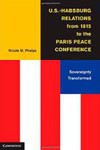From the publishers:
This study provides the first book-length account of U.S.-Habsburg relations from their origins in the early nineteenth century through the aftermath of World War I and the Paris Peace Conference. By including not only high-level diplomacy but also an analysis of diplomats' ceremonial and social activities, as well as an exploration of consular efforts to determine the citizenship status of thousands of individuals who migrated between the two countries, Nicole M. Phelps demonstrates the influence of the Habsburg government on the integration of the United States into the nineteenth-century Great Power System and the influence of American racial politics on the Habsburg Empire's conceptions of nationalism and democracy. In the crisis of World War I, the U.S.-Habsburg relationship transformed international politics from a system in which territorial sovereignty protected diversity to one in which nation-states based on racial categories were considered ideal.
– This book takes the ceremonial activities, social activities and administrative work of consuls seriously, prompting a rethinking of the importance of these frequently dismissed activities in international relations,
– it also combines a study of high politics with an account of the role of everyday people in shaping international relations, the operation of state, and definitions of sovereignty and identity
– it finally demonstrates the involvement of the U.S. in international affairs prior to WWI, countering the traditional narrative of isolation.
Review of this book by Dr Stephen Tuffnell in Reviews in History, dated 6 March, 2014.
U.S.-Habsburg Relations from 1815 to the Paris Peace Conference: Sovereignty Transformed
Author(s) : PHELPS Nicole M.

- Year of publication :
- 2013
- Place and publisher :
- Cambridge: Cambridge University Press
- Number of pages :
- 301

